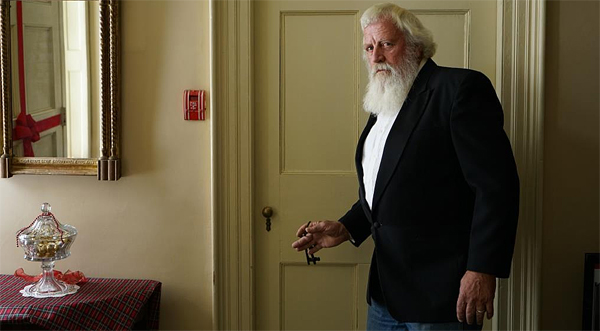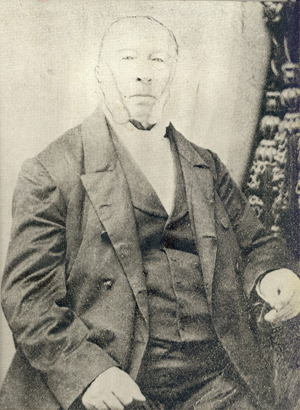Escape Room a new approach to sharing County history
Administrator | Feb 14, 2019 | Comments 0
 Opening Flashback February celebrations, the County Museums is launching an Escape Room experience, using the summer kitchen and handyman’s quarters at Macaulay House as the stage for a new, interactive way to experience local history.
Opening Flashback February celebrations, the County Museums is launching an Escape Room experience, using the summer kitchen and handyman’s quarters at Macaulay House as the stage for a new, interactive way to experience local history.
“Escape Macaulay House is meant to build a sense of community and place with a new approach to sharing history and heritage,” said Jennifer Lyons, Head Curator.
The attraction is based on real life events. In 1846, Rev. William Macaulay fell behind on payments to his servants. The escape room challenges participants to find clues and solve puzzles that will ultimately lead to hidden treasures. Players must work together, as they’ll only have an hour to find and solve all the clues.
The experience will run year-round.
Museum staff suggested the escape room experience, based on information shared at an Ontario Museum Association meeting in Kingston. There, representatives of the Murney Tower National Historic Site shared their positive experience of establishing an escape room.
Escape Rooms have also been successfully incorporated at other historic sites, including Kingston’s Military Communications and Electronics Museum, Windsor’s Fort Malden National Historic Site, Woodstock Museum National Historic Site, and Toronto’s Casa Loma.
The Escape Room Experience opens Saturday, Feb. 16.
The year is 1846 and Reverend William Macaulay has fallen behind in paying his servants. Payments are so delayed, the servants are beginning to get desperate. A stash of jewelry and precious metals is rumoured to be hidden somewhere in the house – your help is needed to solve a series of clues and puzzles to find it.
It’s a giant puzzle. Players must find and use clues to solve riddles and puzzles and unlock a series of locks.
The room is not locked, not scary (children as young as 12 can play as long as they’re working with an adult) and if players get stuck, there’s a servant on hand to help with hints. Groups of six welcome – dress warmly in the winter months! Macaulay House is heated – but it’s also an old house, so if you’re prone to feeling the cold, layer up!
No phones or cameras are allowed inside the room as players are in a Victorian home and the game transports you to a Victorian time, when phones and cameras would have weighed a ton or only available to the elite.
The Escape Room is based on truth, as described below:
By Jessica Chase, assistant curator of The County Museums

William Macaulay
William Macaulay became a land baron at only six, when he inherited 400+ acres of land in Hallowell from his father, a wealthy merchant with sizeable land holdings through eastern Ontario. But the young Macaulay wasn’t always wise with his wealth – and his debt management inspired the Escape Macaulay House experience.
While William’s brother, John, decided to pursue a career in government, William looked to the church. He completed a degree in theology at Oxford University, was ordained in 1819, and settled at Hallowell to establish The County’s first Anglican parish, now part of Macaulay Heritage Park.
William married Ann Geddes in 1829, and due to his extensive land holdings and family connections, they lived in relative comfort.
It was around this time that William started referring to his neighbourhood as “Picton,” after General Thomas Picton, a Napoleonic War figure who he admired. (While Picton was lauded as a capable soldier, he was also decried for the brutality and torture he employed during the decade he was Governor of Trinidad.)
While land-rich, Rev. Macaulay was not particularly savvy with his money.
Family letters reference debts owed to local merchants, as well as those in Kingston, Toronto and elsewhere. His brother John frequently wrote to their mother complaining about William’s flippant attitude regarding his debts, and annoyed with the fact that William sometimes borrowed money against John’s good name without asking permission.
A seemingly casual attitude toward paying off these debts, combined with a tendency to not collect rent from tenants on his land and his wife’s chronic poor health, meant that the Reverend often found himself in a tight financial spot.
This did not bode well for those employed by him.
The Macaulays, as a prominent local family, employed a household staff consisting of between two and four female servants: one to cook, and the others to keep house, do the washing and attend to the family’s general needs. There were also a small number of male labourers who worked Macaulay’s farm and tended to the family’s livestock.
Being a domestic servant in the mid-19th century was no picnic, as all members of the household staff were awake well before the Macaulay family to ensure that the Reverend and his wife were kept warm and fed.
The female staff would creep down the servants’ staircase before dawn to start a fire in the hearth in the home’s main kitchen, and get to work on the day’s tasks. The fire stayed lit the whole day to cook the family’s meals, boil water for bathing and washing, and to generate heat for the entire home, including the female servants’ quarters, which were directly above this main, winter kitchen.
In the summer months, the female staff would move out of the winter kitchen and cook over a stove in the cooler summer kitchen. This kept the rooms used by the Macaulays at a comfortable temperature.
The accommodation for male staff, however, was directly located above the summer kitchen. This unfortunately meant that it was freezing cold in winter and stiflingly hot in summer.
Wages for domestic servants depended heavily on how many staff worked in the home, and whether a household was rural or urban. In the case of the Macaulays’ staff, by the mid-1840s the manager of their farm had an annual wage of about £23 per year (approximately $5,000 in today’s currency).
The family’s cook was paid about £5 annually, and the other female servants likely would have earned less. Their room and board was always looked after, and the money they earned was often put into savings accounts or sent overseas to family members.
In 1846, however, Ann Macaulay wrote to her brother-in-law expressing anxiety and feelings of regret because she and her husband had been unable to pay their servants for months on end.
“I cannot be happy or at ease in the least are long as I think that people will have to be put off when they call for what is justly their due.”
It is this instance that inspired Escape Macaulay House, The County Museums’ new Escape Room – an experience that enables players to explore Macaulay House in a way they never expected.
Book a team of two to six players, and see how well you can work together to make sure everyone gets paid.
For more information and to book tickets, visit www.visitpec.ca/escape
For other Flashback February events, visit https://www.visitpec.ca/flashback-february/
Filed Under: Arts & Culture • Featured Articles
About the Author:































